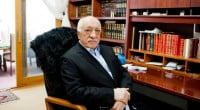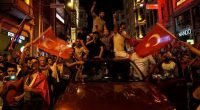Fethullah Gulen denies ties to attempted coup in Turkey
Date posted: July 18, 2016
As a wave of violence washed over Turkey, President Erdogan pointed the finger of blame to Fethullah Gulen. In a rare interview with CNN’s
Source: CNN , July 16, 2016
Tags: Defamation of Hizmet | Fethullah Gulen | Hizmet and politics | Military coups in Turkey |
Related News

Gülen lawyer denies claims of shooting movie about Erdoğan family
A lawyer for Turkish Islamic scholar Fethullah Gülen, Nurullah Albayrak, has denied claims that the scholar or his sympathizers are shooting a movie about Turkey’s prime minister and his family.

Did Turkey Really Save Democracy On July 15?
The government is yet to renovate that place, preserving the area for foreign delegations as a showcase for the savagery of putschist soldiers. Ankara makes sure that every visiting foreign official is making their pilgrimage to the site, through dust and scattered rocks, so that they see firsthand how the mutineering soldiers attacked the Turkish democracy.

Child victims to be affected by smear campaign against KYM
The smear campaign conducted by the Justice and Development Party (AK Party) government against Kimse Yok Mu (Is Anybody There) — a charity run by the Hizmet movement inspired by prominent Turkish scholar Fethullah Gülen — will affect the children, including victims of sexual assault, staying in the Women’s Shelter of Tacloban City in the Philippines.

Gulen: Erdogan will end up like Hitler and Stalin
[Erdogan] is trapped in his contradictions. All narcissistic dictators and tyrants like Hitler and Stalin have a bad ending. Their reign always ends in fury. He will suffer the same fate.

Why won’t Obama extradite Gulen?
Turkish Prime Minister Recep Tayyip Erdogan said that he had complained to President Barack Obama about Fethullah Gulen in phone conversation. Erdogan added that Obama had responded favorably. The White House retorted in unusual language, telling journalists: “The response attributed to President Obama is not accurate.”

As I researched the Gulen schools in Germany, I experienced beyond what I had expected
Dr. Jochen Thies’ new book focuses on Gulen-inspired Schools in Germany. Dr. Jochen Thies introduced the book he wrote about the schools opened in Germany by Turkish entrepreneurs: “We Are a Part of This Society-A Look at the Education Initiatives of the Gulen Movement”. Dr. Gunther Mulack, Director of the German Orient Institute, who was also […]


















